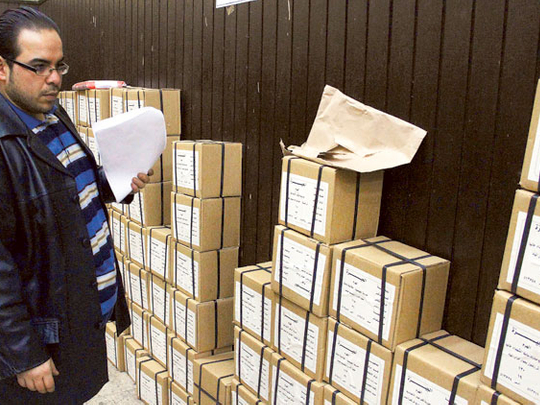
Cairo: Egypt’s draft constitution is made up of 247 articles, including 42 new stipulations mostly tackling individual, political and socioeconomic freedoms. The draft also has a preamble referring to Egypt as a “democratic, modern country with a civilian government”.
If approved, the statutes would replace the one adopted in a public vote in December 2012.
The following are highlights of the document that will be the focus of a two-day referendum beginning Tuesday.
Religion: The draft continues to refer to “principles of Islam” as the main source of legislation, making it up to the rulings of the Supreme Constitutional Court to explain these principles.
The charter abolishes a controversial article that was introduced into the 2012 constitution, which says: “The principles of Sharia include general evidence, foundations, rules and jurisprudence as well as sources accepted by doctrines of Sunni Islam and the majority of Muslim scholars.”
The revised constitution pledges “absolute freedom of belief”, but restricts freedom of practicing religious rituals and building places of worship to the three heavenly religions of Islam, Christianity and Judaism.
President: Egyptians hoping to stand for president have to secure endorsements of at least 20 members of parliament or 25,000 signatures from at least 15 of Egypt’s 27 governorates.
The hopefuls must not be younger than 40 years with their parents being Egyptians. Parliament has the right to impeach the president with the approval of two thirds of its members. The president, who can stay in office for a maximum two terms of four years each, is given the right to appoint 5 per cent of the parliament’s members.
The president is empowered to appoint a prime minister, who must be endorsed by parliament. In case parliament refuses to give a vote of confidence to the premier-designate, the president must accept the choice made by the party or coalition that wields the majority in parliament. If the proposed government fails to win parliament’s confidence, parliament will be dissolved and new elections called.
Parliament: All legislative powers are devolved to the House of Representatives after the drafters of the constitution agreed to abolish the Shura Council or the upper house of parliament.
The state is committed in the charter to ensure “suitable representation” for workers, farmers, women, Christian minority, youth and people with disabilities in new parliament whose mandate runs for five years.
The draft scraps a 50 per cent quota that used to be allocated for workers and farmers in parliament. It also bans political activities and the creation of political parties on religious grounds, raising doubts over the future of around 18 Islamist parties already in existence.
Military: The charter says the defence minister is to be appointed in agreement with the Supreme Council of the Armed Forces for a transitional period of two presidential terms (eight years in total).
The document allows military courts to try civilians accused of “direct attacks” on army installations, hardware and personnel. The National Defence Council, led by the head of the state and comprising the prime minister, the parliament speaker, minister of defence, the interior, finance and foreign affairs, as well as the intelligence chief, the army chief of staff and army commanders, is tasked, among other things, with debating the army budget.
Freedoms: The charter obliges the state authorities to ensure equality between women and men in all civil, political, economic, social and cultural rights and protect women from all forms of violence.
It criminalises all forms of discrimination, torture and forcible displacement. It prohibits slavery, sex trade and human trafficking. The state authorities are also committed to abiding by all international agreements, including those pertaining to human rights already signed by Egypt. The draft, meanwhile, abolishes jail penalties in publication offences, a long demand by Egypt’s press community.












